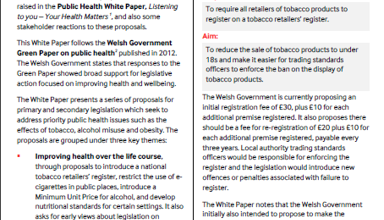It can be difficult to keep track of what’s happening and the latest policy developments in the adult social care sector.
In this reference guide, we aim to bring together the various Welsh Government and Senedd developments in one handy place.
Welsh Government’s Rebalancing care and support programme.
The Welsh Government recently consulted (May – August 2023) on a number of proposals related to its Rebalancing care and support programme, some of which involve changes to Codes of Practice and Regulations related to the Social Services and Well-being (Wales) Act 2014. The proposals included:
- The creation a National Framework for the commissioning of care and support, setting new standards for commissioning services (in a new Code of Practice)
- The creation of a National Office for Care and Support. It is proposed that this new National Office will sit within Welsh Government with three core functions: oversight of and compliance with the National Framework; the development and implementation of the National Care Service; and support for the Chief Social Care Officer.
- “Strengthening of Regional Partnership Board arrangements” by amending the Partnership Arrangements (Wales) Regulations 2015 and revising Statutory Guidance on partnership arrangements to support further integration of services.
Evaluation of the Social Services and Well-being (Wales) Act 2014
The Senedd’s Health and Social Care (HSC) Committee and Public Accounts and Public Administration (PAPA) Committee held evidence sessions with academics in May 2023 after the publication of the independent evaluation of the Social Services and Well-being (Wales) Act 2014.
See our articles for background information on the evaluation of the Act.
Following the sessions the Committees wrote a joint letter to the Deputy Minister for Social Services (July 2023) expressing their views that the Welsh Government’s recent consultation presents a prime opportunity to address issues raised in the evaluation and evidence sessions. The Deputy Minister confirmed the points are being considered and that the Welsh Government would provide a fuller response following the close of the consultation.
Social care workforce developments
Our article Social Care: a workforce in crisis? sets out the huge challenges facing adult social care.
Implementation of the Real Living Wage began in April 2022. In January 2023, the Deputy Minister noted that wages are “still not enough to really compete”, and that pay, terms and conditions need to improve further.
The Social Care Fair Work Forum was established in September 2020. It published a progress update in 2023 setting out plans such as a voluntary model of collective bargaining, aiming to improve parity on terms and conditions. The Deputy Minister told the HSC Committee in January 2023 that the Forum would try to set this up by April (but nothing further has been published in the public domain as yet).
The recent Rebalancing Care and Support consultation (May – August 2023) included proposals developed by the Forum for the principles of a Pay and Progression Framework for the social care workforce. According to the consultation, “the Framework will be a voluntary guide”, initially limited to workers providing direct care.
The Forum said in its recent progress update that it sees sick pay as an urgent priority for staff working in the independent sector and “will continue to look at how improvements can be made to sick pay provision”.
The HSC Committee said in February 2023 that it is not yet persuaded that the Forum’s work is being progressed at the pace needed; or that voluntary measures for collective bargaining and pay structures are adequate to address workforce shortages.
The HSC Committee’s hospital discharge inquiry concluded that the lack of social care capacity was the biggest contributor to delayed discharges and restricted patient flow through hospitals (June 2022). Read our article for more information about the findings from the inquiry.
In November 2022 the HSC Committee also held a session with Care Inspectorate Wales (CIW) to discuss the key issues faced by the care sector. Following this, the Committee wrote to the Deputy Minister in December 2022 to highlight concerns and press for further action.
Social Care Wales and Health Education and Improvement Wales (HEIW) produced a 10 year joint health and social care workforce strategy and delivery plan, along with specific plans on mental health, social work and ‘direct care’.
Social Care Wales published its social care workforce survey in October 2023. Results from the survey include:
- Just over a quarter (26 per cent) feel it’s ‘quite’ or ‘very’ likely that they’ll leave the social care sector in the next 12 months, and 44 per cent feel at least ‘quite likely’ to leave in the next five years.
- The most common reasons given for expecting to leave in the next 12 months are pay (66 per cent), feeling overworked (54 per cent) and poor employment or working conditions (40 per cent).
Following the publication of the survey, the Deputy Minister for Social Services said:
I am absolutely committed to improve pay, terms and conditions and to address recruitment and retention issues in the sector – both directly, and through our sponsorship of Social Care Wales.
Unpaid carers
The Welsh Government has published a Strategy for unpaid carers: delivery plan 2021; an annual report on the delivery plan for 2022; and a charter for unpaid carers to explain their legal rights (September 2022).
Carers representatives gave evidence to HSC Committee hospital discharge inquiry and NHS waiting times inquiry. The Committee’s report on the Welsh Government’s draft budget 2023-24 also includes a section on unpaid carers.
One of the Committee’s recommendations in the hospital discharge inquiry was for the Welsh Government to undertake a rapid review of whether carers’ rights under the Social Services and Wellbeing (Wales) Act 2014 are being breached. In response Welsh Government said a review of the quality and effectiveness of carers’ needs assessments would be commissioned by the Chief Social Care Officer in that financial year (2022-23). It said this would include a review of how the rights of unpaid carers are being upheld.
More recently, in a carers debate in Plenary in June 2023,, the First Minster said the Association of Directors of Social Services (ADSS) Cymru had been commissioned to undertake a rapid review of carers’ rights at a local authority level.
ADSS published its rapid review in November 2023. The review’s findings include:
For most carers, the increasing cost of living has now eclipsed concerns about Covid-19. The financial impact of being an unpaid carer can be significant and many are struggling.
There are waiting lists for carer’s assessments in most areas, which prevents carers having the support they need. Many carers are not being offered assessments.
There is a significant lack of awareness of carer’s rights under the Act. Before any rights can be upheld, unpaid carers must be identified and engage with social services. For a variety of reasons, some are reluctant to do so.
While many carers have support, feedback from the large sample of carers reached by this review indicates a deficit in meeting carer’s needs. Some of this might stem from the lack of awareness of carer’s rights and the help available and how to access it, but some reflects a lack of support provision or suitable provision where carers live. Respite care is the most significant unmet need.
A National Care Service
The Welsh Government established the National Care Service expert group in February 2022 to advise on the practical steps towards delivering a national care service free at the point of need. The Co-operation Agreement with Plaid Cymru emphasised this pledge, and added a commitment to agree an implementation plan by the end of 2023. The Deputy Minister stated in July 2023 that “an initial implementation plan” will be published “later this year”.
The National Care Service Expert Group’s report was published on 10 November 2022. Its report notes that a National Care Service will require long-term thinking, and long-term investment, likely over a period of at least 10 years.
The Deputy Minister described the establishment of a national office for care and support and a national commissioning framework as “amongst the first important building blocks of a national care service” (in June 2023). The Deputy Minister said the aim is to get the national office up and running by the beginning of next year (2024), and then the framework will follow on from that.
The Deputy Minister said the Welsh Government will be looking at how a National Care Service could be funded, but due to the current financial situation, “we can't give any commitment as to when we'll actually be able to do that.” She said the focus is getting the building blocks in place so that when the financial situation improves longer term, “we will be in a position to move forward when we're able.”
Potential changes to primary legislation
In November 2022 the Welsh Government consulted on a number of changes to primary legislation, including proposed changes to introduce Direct Payments for Continuing NHS healthcare (CHC).
In June 2023 the Welsh Government published a summary of the consultation responses and its response on each proposal.
Article by Amy Clifton, Senedd Research, Welsh Parliament






